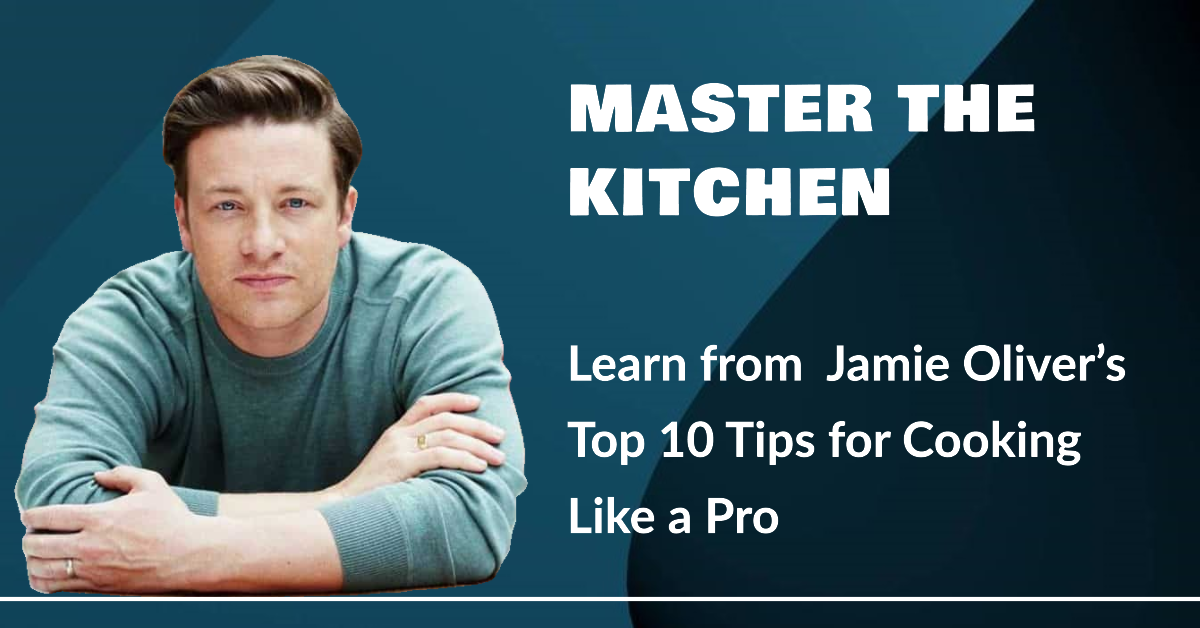Jamie Oliver is a British chef, restaurateur and cookbook author who is famous for his casual and creative approach to cuisine. He started his career as a pastry chef at Antonio Carluccio’s Neal Street restaurant, where he learned Italian cooking from his mentor Gennaro Contaldo. He became a TV star with his show The Naked Chef in 1999, and since then he has hosted many other shows and opened several restaurants, including Jamie’s Italian. He is also an advocate for healthy eating and food education, and he launched campaigns such as Feed Me Better and Jamie Oliver’s Food Revolution to improve the quality of food served in schools and communities. Here are some of his top 10 tips.
- Plan your week: Get organised by planning your meals for the week and making a shopping list of what you need. This will help you save money, time and avoid food waste. Jamie Oliver believes that planning ahead is the key to cooking well and eating healthily. He proposes looking at your schedule and deciding what kind of meals you want to make, then writing down the ingredients you need and sticking to your list when you go shopping. He also urges checking what you already have in your fridge, freezer and cupboards before you buy anything new, and using up what you have.
- Batch cook budget-friendly recipes: Cook in bulk and freeze the extra portions for later. This will help you have ready-made meals for busy days and make your ingredients go further. Jamie Oliver enjoys batch cooking because it saves time, money and energy. He claims that you can make big batches of soups, stews, curries, pies, casseroles and more, and freeze them in individual portions for easy reheating. He also advises using cheaper cuts of meat, seasonal vegetables and beans and lentils to stretch your budget and add flavour and nutrition.
- Love your leftovers: Don’t throw away excess food, but transform it into delicious dishes. You can use leftover herbs, roasted vegetables, tinned tomatoes and more to create new meals. Jamie Oliver despises wasting food and states that leftovers are one of life’s great pleasures. He asserts that you can use leftover meat, fish, cheese, bread, rice, pasta and more to make salads, sandwiches, frittatas, quesadillas, pizzas and more. He also recommends using leftover herbs to make pesto, salsa verde or chimichurri, and leftover roasted vegetables to make soups, sauces or dips.
- Make easy swaps: Use whatever ingredients you have on hand and adapt recipes to suit your taste and budget. You can swap different vegetables, cheeses, meats or spices to create your own versions of dishes. Jamie Oliver argues that cooking is not about following recipes exactly, but about being creative and flexible. He explains that you can swap ingredients based on what you like, what you have and what’s in season. For example, you can use cauliflower instead of potatoes, feta instead of mozzarella, chicken instead of beef or cumin instead of paprika. He also suggests that you can use different cuisines as inspiration and mix and match flavours and techniques.
- Celebrate store-cupboard heroes: Stock up on some essential items that can boost flavour and add variety to your dishes. Think of dried herbs, spices, jarred pastes, preserves, beans, lentils, rice, pasta and more. Jamie Oliver maintains that having a well-stocked store cupboard is the secret to cooking delicious meals with minimal effort. He demonstrates that you can use these items to make quick and easy sauces, dressings, marinades, soups, curries, stir-fries and more. He also indicates that you can use these items to add texture, colour and interest to your dishes. For example, you can use nuts, seeds, dried fruits, olives, capers, pickles and more.
- Be energy efficient: Use your appliances wisely and only use what you need. Use the microwave for quick and easy dishes, fill up the oven when you use it, put a lid on your pans to keep the heat in and chop your vegetables smaller to cook them faster. Jamie Oliver asserts that being energy efficient is good for the environment and your wallet. He explains that you can save energy by using the right appliance for the right job, and by using it efficiently. For example, you can use the microwave to cook rice, potatoes, vegetables and more, and use the oven to cook multiple dishes at once. He also explains that you can save energy by reducing the cooking time and temperature of your dishes, and by using less water and oil.
- Use a sharp knife: A sharp knife will make your chopping easier, faster and safer. You can sharpen your knife with a steel or a whetstone, or get it professionally sharpened. Jamie Oliver emphasizes that using a sharp knife is one of the most important skills in the kitchen. He explains that a sharp knife will help you cut your ingredients more evenly and precisely, which will improve the appearance, texture and flavour of your dishes. He also explains that a sharp knife will reduce the risk of injury, as you will need less force and pressure to cut through your ingredients. He advises sharpening your knife regularly and taking good care of it.
- Season well: Seasoning your food with salt, pepper and other spices will enhance the flavour and make your dishes more delicious. Taste as you go and adjust the seasoning to your liking. Jamie Oliver emphasizes that seasoning is the difference between good and great food. He explains that salt and pepper are the most basic and essential seasonings, and that you should use them generously and wisely. He also explains that you should use other spices and herbs to add depth, complexity and character to your dishes. He advises tasting your food as you cook and adding more or less seasoning as needed.
- Use a thermometer: A thermometer will help you cook your meat, fish and poultry to the perfect doneness and avoid overcooking or undercooking. You can also use it for baking, frying and making candy. Jamie Oliver recommends that using a thermometer is the best way to ensure that your food is cooked properly and safely. He explains that different types of meat, fish and poultry have different ideal temperatures, and that you should check them with a thermometer before serving. He also explains that you can use a thermometer to check the temperature of your oven, oil, sugar and more, and that this will help you achieve the best results.
- Save some pasta water: When you cook pasta, save a cup of the starchy water before you drain it. You can use it to loosen up your pasta sauce and make it more silky and smooth. Jamie Oliver suggests that saving some pasta water is a simple but effective trick to improve your pasta dishes. He explains that the starchy water will help bind the sauce and the pasta together, and that this will create a more creamy and glossy texture. He also explains that the starchy water will add some flavour and seasoning to your sauce, and that this will make it more tasty.
239600cookie-checkHow to Cook Like a Pro with 10 Best Tips from Jamie Oliver
(Visited 17 times, 1 visits today)




